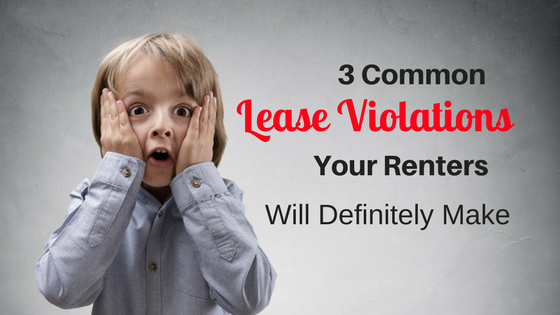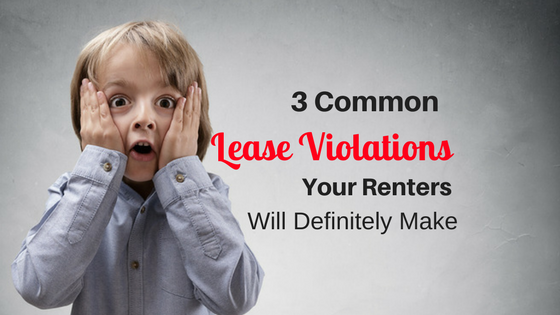 A strong lease agreement is a landlord’s best friend. A lease provides a binding contract to enforce your property rules and serves as the foundation for a solid landlord-tenant relationship.
A strong lease agreement is a landlord’s best friend. A lease provides a binding contract to enforce your property rules and serves as the foundation for a solid landlord-tenant relationship.
Part of your job as a good landlord is making sure you approve the most qualified tenant to live in your rental property. One of the major qualifiers during your tenant screening process must include finding a tenant who respects the terms of the lease and has a history of following rental rules.
Despite your best efforts to approve the most qualified, rent-paying tenant, there will probably come a time in your landlord career where you will have to deal with a lease violation.
Here’s a look at some of the most common lease violations and how to deal with them.
Unauthorized Pets
Whether you have a “no pets allowed” or a “pets upon approval” policy, at least one of your tenants will try to sneak in a pet without telling you. Unauthorized pets are often reported by a maintenance vendor or neighbor who spots a pet when there is not supposed to be one.
Solution: If you suspect that your tenant is keeping a pet you haven’t agreed you need to follow through with the terms of your lease and notify your tenant of the violation. It is a good idea to get photographic evidence, if possible.
Typically, you will send your tenant an official notice stating the lease violation and the timeline in which the tenant needs to fix the situation (ie remove the pet). This timeline is largely dependent on your state laws and what your lease says. In some cases, you can give your 24hrs to remove the pet while other states may require 3-7 days to remedy the situation.
Tell your tenant that if they do not comply with the timeline to remove the unauthorized pet, you will move forward with an eviction.
- Learn More: My Tenant Has an Unauthorized Pet – Now What?
Long-Term Guests
Any person who stays at your property that is not listed on the lease agreement is considered a guest of your tenant. A temporary guest transitions into a long-term guest when they take up residence on your property without permission from a manager or owner.
Long-term guests may be a boyfriend or girlfriend who spends the majority of their time at the property. A friend who needs a place to crash after moving or losing their job. Or a family member who is in town for an extended visit.
Long-term guests can become a liability to a landlord or manager when they fail to uphold the rules of your property and conditions in the lease agreement
Solution: Most lease agreements have language requiring a tenant notify management if a guest intends to be on the property longer than XX number of days. Management wants to make sure that all adults staying at the property for an extended period of time are approved and added to the lease if necessary.
A long-term guest is not necessarily a bad thing, but they do need to be held accountable for the lease terms and conditions of your property and the only way to enforce this is to have them sign an addendum adding them to the lease.
If the long-term guest refuses to sign a lease agreement you might need to move forward with an eviction of your tenant for failing to follow the lease terms regarding long-term guests.
- Learn More: Do Your Tenants Have Long-Term Guests
Decorating that Causes Damage
Standard lease agreements stipulate that a rental unit will need to be returned in the same condition as move-in; failure to do so will result in security deposit deductions and possibly additional fines.
While most tenants understand that this means if they break a window, they will need to replace it. But do your renters realize how much this will severely limit their decorating abilities?
Most people want to make their house feel like a home, and adding a personal touch through decor is an excellent way to turn a boring rental property into a comfortable space. However, every nail hole from hanging picture or curtain rod that is added to a window will take its toll on the property, essentially changing it from its original pe-move state.
A couple of thumb tacks holes in the wall or nail holes can easily be patched but what about when your tenant decides to paint? Or change the light fixture in the bathroom? And what if the tenant does a poor job with the application or installation?
All these “personal touches” are essentially damage to your property that will need to be fixed by you upon move out (even if it’s paid for by the security deposit).
Solution: You lease should include specific language about decorating the property.
Some example lease clauses regarding decorating include:
-No painting or decorating without prior written approval
-Pictures and other items are not allowed to hung on the wall
-Pictures and other items may only be hung by preapproved methods
-Adhesive picture hangers of any kind are prohibited.
-Picture hangers employing a small nail or pin are permitted, however, Tenant is responsible for the cost of any repairs or painting required as a result of hanging pictures or other objects
-Any accessories such as towel bars, coat hooks or shelves, etc may not be added without the prior written consent of the Owner.
These are just a few examples of how you can phrase your damage-free decorating requirements in your lease agreement. You need to decide what type of decorating you will allow and what is going to unacceptable.
You will most likely discover unapproved decorating that damages the property during a routine maintenance visit, or if you get an emergency maintenance call from a tenant who tried to install an unapproved appliance or item that caused significant damage.
To prevent unauthorized decorating, give your tenants a reminder handout on the day they move in that reminds them what kind of personalization is allowed at the property. If you notice a violation mid-lease, send your tenant an official notice if an item needs to be removed. You are also within your right to deduct from the security deposit the cost to remove the decoration or fix any damages once the tenant has moved out.
Give your tenants some tips for how to add a personal touch to their rental with some damage-free decorating ideas for renters.
- Best Tips for Damage-Free Decorating Your Rental
- Renter-Friendly Holiday Decorating Ideas
- 5 Dollar Store Decor Items Every Renter Needs
Stop The Problem When They Start
If one your renters breaks a clause in your lease agreement, you need to handle the situation right away. Letting a first-time offense or brushing something off as “not that big of deal” will set the precedents for your tenants to behave badly.
A good landlord will inform a tenant of the infraction, site the lease term that was violated, and give the tenant a way to remedy the problem. If a tenant becomes a repeat offender you may need to move forward with an eviction.
For problem tenants or for more serious lease violations, it is a good idea to contact an attorney or property manager in your area if you need to take legal action. These professionals can offer you advice and experience for how to best handle the situation.







Fortress Property Management in Portland Oregon are the bottom of the barrel. That combo of incompetency and laziness that’s just… magic.
Yeah… this article is not in compliance with all state laws and is basically giving bad landlords a reason to be even worse. Please read your STATE laws on tenant rights. The above is false.
I am curious what you found false in the above article. We try to provide helpful content for those looking for information on renters, landlords, and renting in general. We always aim to share accurate information with our readers and welcome feedback to strengthen our content.
Every state and city have their regulations. I’m in L.A. and its very difficult to evict a tenant. It’s like the tenants have more rights than the owner. Sad to say but true. It’s important get informed of the tenants rights before going foward.
My landlord demanded I take down a negative review saying it was slanderous and HUD wanted it removed right NOW! There was nothing slanderous in it. My case manager and the Section 8 manager knew nothing about the review. He now refuses to do any maintenance because of this issue. During that same conversation he yelled fine your lease is revoked, but I’m keeping your deposit. I have only lived here one and a half months. He is now ignoring my request to sign the form from HUD releasing me from my lease. What do I do now?
That sounds like retaliation and it is illegal. Call your local housing authority for free advice about next steps to take. I would also report this behavior to your case manager and your contact at section 8, as it is not acceptable landlord behavior.
i lived above my manager and i feel harrased now simce she is accussing me.of me making noise all day yes i am.home all day is due to my disability and my three year old normal kid playing day time…
I was given 30 days to leave my rental mobile park without a reason. My family rent 4 units here. She sent my brother a notice as well with less than 30 days and today my niece. No one owes money for rent. I have until 11/30. She has done this to many others. All Latino families since she became the manager 2 yrs ago. I have two disable children and work very hard to support all 3 of them. It’s impossible for me to find an affordable place this soon. Especially after a car accident I had recently. She has threatened me for 2 years straight. Most recently with an eviction without any cause.I want to leave because she has taken my peace away. Just need to find out how to fight this to have a little bit more time to do so.
I’m sorry to hear about your troubles and challenges. You may want to review your lease or rental agreement. Perhaps you’ve missed a clause or section that allows them to give you notice to vacate. Secondly, I would suggest contacting your local housing authority and ask them to review the notices you’ve received and your rental/lease agreement. They would best be able to address the regulations in your state or local area.
Can a tenant file for harassment if she has done everything asked and the landlord threatens to evict if the tenant doesn’t use her cleaning company?
Hi Suzanne, that would depend on a few factors such as the lease terms and their local and state regulations. It would be advised they review their lease with the local housing authority to discuss those regulations. If that tenant feels the landlord is operating outside of regulations and lease terms, they could speak with legal counsel who will inform them if a harassment suit is a valid option.
Our manager/pastor done way too much to us and still doing and we are not the only ones that he be doing wrong.
1. Giving a false eviction due to an accident incident.
2. Threaten eviction for not pressing charges on whomever complain on someone. manager did held two threats of eviction on me on two different situation and finally he did threaten me with h eviction and the only option he gave us was that my boyfriend and I moved in together on a fresh lease as my boyfriend head of household.
3.;My son was on my lease but because my son would not press charges on someone that same night my son ended up homeless, my son was not given no eviction manage/pastor said “you don’t press charges your mom will be evicted and you will be band.
4. Manager had us on restriction for a little over 2yrs. Meaning no visitors of ours was welcome only our moms and his mom caregiver was not allowed to come in with her.
5. After the accident incident we got deny of dumpster use and Manager/pastor had alternate our rent and had us on an eviction without our knowledge on two different times because he ended up relocating us.
Since we was on eviction than how come we was relocated a month later from incident and on a false eviction of 3 days which was the last 3 days of 90 days that we didn’t know of till after we had received that 3 days notice. Also staff and tenants here knew of our evctition before we did, that supposed to be confidantial.
The water was off for 5 days after a month of that incident and Manager’s wife told another tenant here that it was out fault but when it was not had nothing to do with us or of out incident. Judge caught him in his own lies so he prugy in court and still not arrested. The only reason why we lost the 2nd one is because our response got turned in blank and that was legal aid doing do this time judge couldn’t talk to us since the response was blank. Do now we just waiting for sheriff to do the lock out on us. We had the same judge too from the last time. We was so excited and relieved to have the same judge but didn’t believe how she said we gotta get out and pay for everything and all this is due to an false eviction and ext…
We have our rent and also 800. Credit towards our rent but management refuse to use out credit and refuse to accept our rent and we got out proof on all this uncalled of in
Is there anyway to get this reversed
Yikes, this sounds like a difficult situation. I advise speaking with a lawyer familiar with landlord-tenant laws in your area, especially one who is experienced handling evictions.
I’ve been living in hell for 1 year the site caretaker began hassling me when I moved I next door to him loud disturbing in my apartment no rest or Peace i complain to the owners of this property over and over they to move me ina down stairs unit and then the lady had a illegal son living in the unit he didn’t like me he started to harass with loud disturbing for 4 months ago I had to call police told management. They didn’t no investigation on it. I was out on meds and they moved out then the site man start to hassling me stalking me in my apartment with loud disturbing noisesi couldt sleep no peace 4 months now I’ve placed many compliments over and over again they threat me with two voilation I knock on the site caretaker door asking him to turn off the noises. He will not.
Bathroom toilet stopped up and overflowed into bedroom and soaked the carpet. Immediately notified landlord and he unstopped toliet and cleaned bathroom floor but he did nothing for the soaked bedroom carpet. After a week of attempting to dry the carpet and a odor developed told landlord and his response was its not that wet and I don’t smell anything. To make a long story short room stinks,carpet is deteriorating, and 3 months have gone by with 5 estimates for carpet but nothing has been done.
I’m sorry you have had to experience that Joann. I would certainly recommend you review your lease and reach out to your local housing authority to ask about your areas regulations and landlord responsibility for the ‘warranty of habitability’ to help you know how to proceed. In the meantime, you might want to try a dehumidifier to pull out additional moisture and this article has some helpful suggestions on odor control: How to Get Rid of Bad Smells in Your Apartment
Landlady batsh&$ crazy. She has great internet which doesn’t reach to my apartment. She gave me her word we would work
It out. I did the research to find what we need and she bought a of equipment that was the exact opposite. She had given me her word when I told her we need a wireless bridge that we could share internet between me, her son, and her for 30$ a month. Now she will not allow je, mathematician phd expert in technical stuff if all kinds and particularly following the instruction manual I have 20 years experience and she will not let me see the instructions or help when she had had the equipment for almost a week and has kit been abke to make it work (duh, it is not what I told her we need). She is I would say harassing me by shouting at me for 20 minutes when I said no that piece won’t work I told you why I’ll tell you again….finally she said “I don’t give a damn about your internet.” Then amazingly after telling her technical phd with 20 years experience with the networking that “it was all Greek to her.” She will not allow me to buy the equipment I need and Install it outdoors. (A wireless bridge so I can teach online. ) will not allow me to see the instructions or tell me brand name and model number so I can look it up and see if we can get it to work. Her son, having no idea how to read a tech manual or follow the directions has been working on it all day I cintinuslly ask him when he Sya it us new to him why am I not helping? Why are you not using the expert you have to help you ? No answer from him either. I want to buy the equipment and he said he will mail the bridge up, but his mother will not let ME buy the stuff I need seriously. No I did not agree to this. She gave me her word. I have a minor child who continually gets Covid ( woke up in 5 days after 1st day school with you guessed it a bad case of Covid). I have no lease but cannot afford to move but thus is pure harassment since I will pay for it And she had no resin to withhold the information from me i mean that is just insane. And she is destroying my high schoolers education and ability. To go to college or her health. I want to know what to do. I feel utterly harassed and am terrified of her since she shouted at me. I want like crazy to
Leave but simply cannot. What to do ?
That sounds difficult, Jennifer. Unfortunately, a verbal agreement in most states isn’t legally binding. Without a lease stipulating internet services are covered and/or available, there isn’t an obligation for the landlord to provide the service or equipment. Having said that, if it were in a written lease, although they would need to provide working internet, I don’t believe they would be obligated to disclose the specific equipment information.
Heated arguments and yelling is never ideal. If you feel you are being harassed, your local housing authority can clarify what falls under harassment in your state and what steps you can take.
In the meantime, if you need wifi quickly and you have a smartphone, consider checking with your phone carrier to find out the cost of turning your smartphone(s) into a wireless hotspot for you and your children to use if this provided internet isn’t sufficient. I hope this resolves quickly for you.